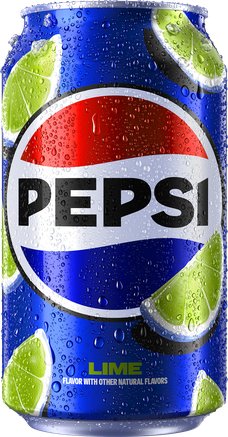List of Pepsi variations
(Redirected from Pepsi Samba)
== List of Pepsi variations ==
Pepsi is a carbonated soft drink produced and manufactured by PepsiCo. Since its creation, Pepsi has introduced a variety of flavors and product lines to cater to different tastes and preferences. Below is a list of notable Pepsi variations.
Regular Variations[edit | edit source]
- Pepsi - The original cola-flavored beverage.
- Diet Pepsi - A low-calorie version of the original Pepsi.
- Pepsi Zero Sugar - A zero-calorie, sugar-free version of Pepsi.
- Pepsi Max - A sugar-free cola with added caffeine and ginseng.
Flavor Variations[edit | edit source]
- Pepsi Wild Cherry - Pepsi with a cherry flavor.
- Pepsi Vanilla - Pepsi with a vanilla flavor.
- Pepsi Lime - Pepsi with a lime flavor.
- Pepsi Mango - Pepsi with a mango flavor.
- Pepsi Blue - A berry-flavored Pepsi with a distinctive blue color.
Seasonal and Limited Editions[edit | edit source]
- Pepsi Holiday Spice - A limited-edition Pepsi with a blend of holiday spices.
- Pepsi Fire - A cinnamon-flavored Pepsi available for a limited time.
- Pepsi Ice - A mint-flavored Pepsi available in select markets.
- Pepsi Salted Caramel - A limited-edition Pepsi with a salted caramel flavor.
International Variations[edit | edit source]
- Pepsi Ice Cucumber - A cucumber-flavored Pepsi available in Japan.
- Pepsi White - A yogurt-flavored Pepsi available in Japan.
- Pepsi Azuki - A red bean-flavored Pepsi available in Japan.
- Pepsi Twist - A lemon-flavored Pepsi available in various international markets.
Caffeine-Free Variations[edit | edit source]
- Caffeine-Free Pepsi - The original Pepsi without caffeine.
- Caffeine-Free Diet Pepsi - Diet Pepsi without caffeine.
Other Notable Variations[edit | edit source]
- Crystal Pepsi - A clear, caffeine-free version of Pepsi.
- Pepsi Next - A mid-calorie version of Pepsi with 30% less sugar.
- Pepsi Natural - A version of Pepsi made with natural ingredients.
- Pepsi Throwback - A version of Pepsi made with real sugar instead of high-fructose corn syrup.
See also[edit | edit source]
References[edit | edit source]
External links[edit | edit source]
This article is a soft drink–related stub. You can help WikiMD by expanding it!
Search WikiMD
Ad.Tired of being Overweight? Try W8MD's physician weight loss program.
Semaglutide (Ozempic / Wegovy and Tirzepatide (Mounjaro / Zepbound) available.
Advertise on WikiMD
|
WikiMD's Wellness Encyclopedia |
| Let Food Be Thy Medicine Medicine Thy Food - Hippocrates |
Translate this page: - East Asian
中文,
日本,
한국어,
South Asian
हिन्दी,
தமிழ்,
తెలుగు,
Urdu,
ಕನ್ನಡ,
Southeast Asian
Indonesian,
Vietnamese,
Thai,
မြန်မာဘာသာ,
বাংলা
European
español,
Deutsch,
français,
Greek,
português do Brasil,
polski,
română,
русский,
Nederlands,
norsk,
svenska,
suomi,
Italian
Middle Eastern & African
عربى,
Turkish,
Persian,
Hebrew,
Afrikaans,
isiZulu,
Kiswahili,
Other
Bulgarian,
Hungarian,
Czech,
Swedish,
മലയാളം,
मराठी,
ਪੰਜਾਬੀ,
ગુજરાતી,
Portuguese,
Ukrainian
Medical Disclaimer: WikiMD is not a substitute for professional medical advice. The information on WikiMD is provided as an information resource only, may be incorrect, outdated or misleading, and is not to be used or relied on for any diagnostic or treatment purposes. Please consult your health care provider before making any healthcare decisions or for guidance about a specific medical condition. WikiMD expressly disclaims responsibility, and shall have no liability, for any damages, loss, injury, or liability whatsoever suffered as a result of your reliance on the information contained in this site. By visiting this site you agree to the foregoing terms and conditions, which may from time to time be changed or supplemented by WikiMD. If you do not agree to the foregoing terms and conditions, you should not enter or use this site. See full disclaimer.
Credits:Most images are courtesy of Wikimedia commons, and templates, categories Wikipedia, licensed under CC BY SA or similar.
Contributors: Prab R. Tumpati, MD


